You need to talk: Why this message is saving blokes’ lives
He’s a dual Magarey Medallist and two-time Sturt premiership captain. But Zane Kirkwood was battling a private hell that eventually exploded seconds after a win.
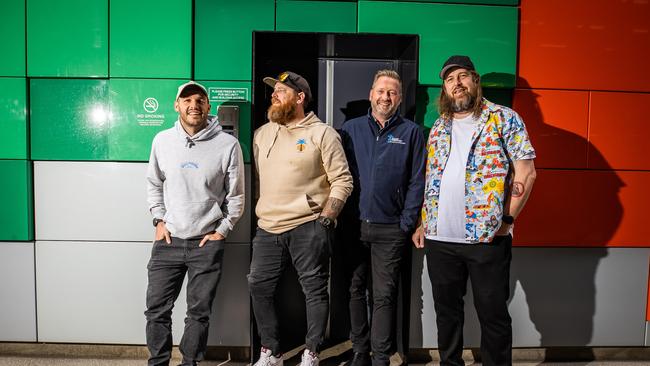
SA Weekend
Don't miss out on the headlines from SA Weekend. Followed categories will be added to My News.
A group of 80 or so men walk into a room. It could be a footy club in the Hills, or a community hall in the country, or a business in the city. The location isn’t that important. It’s what will unfold over the next few hours that really matters.
Jeremy Edwards introduces himself and starts talking. He welcomes everyone to this session of Mates, Meal and Mental Health.
He reassures the group that if anyone is “triggered” by anything that occurs in the room to please seek out himself or his colleagues – he motions to Breakthrough Mental Health Research Foundation chief John Mannion (who also doubles as one of the state’s Mental Health Commissioners), former SANFL footballer Zane Kirkwood and comedian Marc Ryan – at any time.
He says it’s OK to share his story, but no one has permission to share anyone else’s.
It’s also OK to be a little scared, to feel uncertain.
He knows some of this will not be easy.
People will be asked to confront their own truths. To shed the masks they use – we all use – to confront the world.
They start an exercise using a blank mask, a simple outline of a face.
They are being asked: Who are you? And who do you let the world see?
Edwards is asking the group to trust him. To be vulnerable. But this is tough. They don’t really know him. So he shares his story.
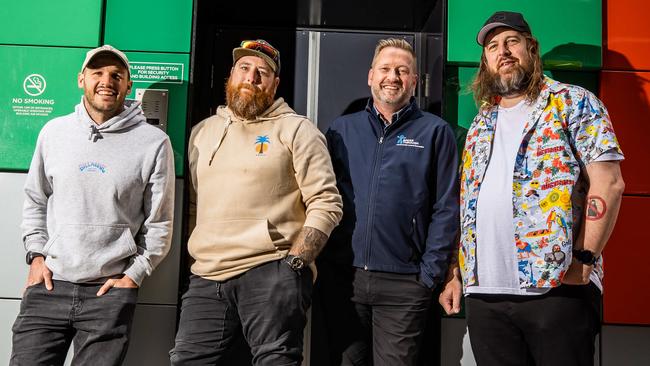
Jeremy Edwards had made a plan. He didn’t see another way out. He was going to take his own life.
He’d struggled with depression and anxiety for as long as he could remember. A worker at the Whyalla steelworks, he’d have a few days off and then get really worked up about going back on the job. It was a continuous cycle.
This time, however, it was really bad and the stress and anxiety had been building up across seven or eight days.
So the decision was made. That night his partner, Sheri, came home from work and knew something was seriously amiss.
“She obviously knew I was a lot worse than I’d ever been before,” he says.
She dragged him to the doctor.
“Sheri led the conversation and said, ‘He’s not being honest with you. He’s a lot worse and he’s putting it on’,” he says.
“And the doctor looked at me and said, ‘Jeremy are you having thoughts of suicide?’.
“I just broke and said, ‘Yeah, I’m going to take my life today,’.”
He was admitted into hospital and from there his recovery began.
“It was a long recovery process, like I still have shit days. I’ve just got the tools to work through it,” he says
The biggest change came when he talked about how he was feeling. It made him feel better but also made him realise that he did have family and friends who loved and cared about him, and would help him through it.
“The support had always been there but I would never let it in,” he says.
“The question was asked 1000 times if I was OK and I was always like, ‘Yeah, I’m sweet, I’m all good’.
“And it wasn’t until I actually allowed myself to be vulnerable – unfortunately, it took for me to get to that point to do that – and allowed the support in, that the healing really started.”
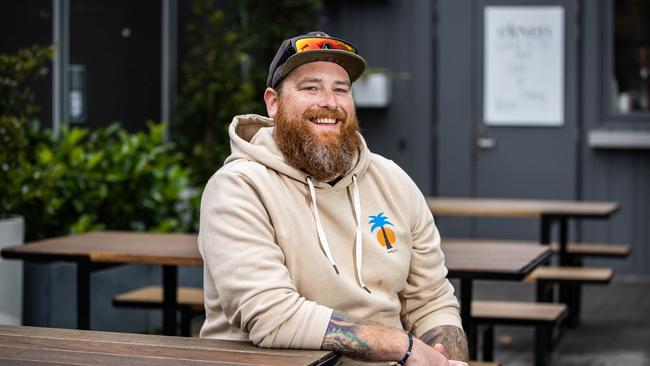
Once he got back on his feet, Edwards realised he had a story to tell that could help others. Playing with South Whyalla Football Club in 2018, the same year as his breakdown, he and his friends were rocked by the suicide of a young guy who used to play at the club.
“So I remember getting a phone call from my mate Gavin Jonker, who was in tears. There was a young lad who used to play for the footy club, he moved away six months to a year previously,” he says.
“He took his life. And we just said ‘Enough is enough, we have got to stop being reactive’.”
They typed out a long message and sent it to one to two players from every footy club in town. Meetings were held, stories exchanged, events organised and it grew from there.
Edwards then co-founded INATT (I’m Not Afraid to Talk) with Jonker.
“It got to a point where it was all well and good popping in and doing a talk, but then people leave,” he says.
“So we developed the workshop, which we aim to actually drop the stigma in the room and create the conversations in the room. People are then supported afterwards.”
Through the forums he came into contact with Wellbeing SA and, from there Mannion, who saw the value and wanted to expand the program.
Mannion brought the Breakthrough Mental Health Research Foundation on board, secured some further funding and Mates, Meal and Mental Health was born.
Edwards still holds workshops off his own steam, but is secure in the knowledge the Breakthrough funding extends for the next few years. His goal from here is pretty simple.
“The main thing for me is actually dropping the stigma and getting people, especially men, willing to say, ‘You know what, I am struggling a bit, I need a bit of support’,” he says.
Edwards tells the group “Well, I hope you know me a bit better now.”
Another exercise starts, this one involving blindfolds, establishing trust and the sharing of vulnerabilities. Questions are asked, responses given.
The topic of the masks we use continues to resonate: “What is it you don’t let people see?”
Before long, the barriers are broken and there is only brutal honesty.
“I realise I’m not alone.” “Do other people really feel like that?” “There are a lot of people going through what I’m going through.”
The team focuses on the similarities in the room and asks: “Why is it always the front of the mask we can talk about and not the back.”
Zane Kirkwood then takes the microphone. He knows a thing or two about this.
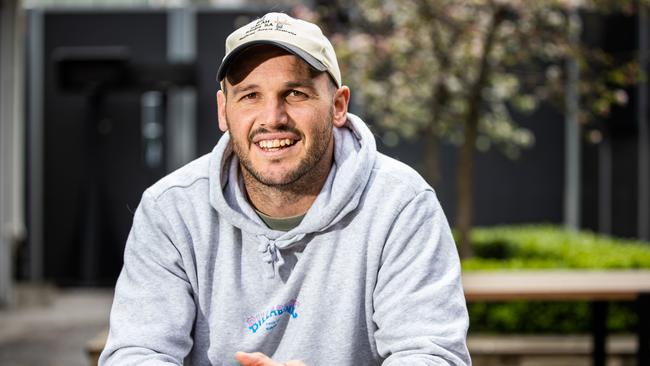
Kirkwood could only find real peace with a footy in his hands.
Be it on game day, on the training track, or just running around the oval by himself, it was the only way Zane Kirkwood knew that would allow him to dull the crippling anxieties which had plagued him since childhood.
“I’ve always loved footy. It’s my happy place,” Kirkwood says.
Footy would stop the racing thoughts and numb the pain; a pain that would see him withdraw from family and friends, stay locked in his room for days, take time off work, spend some time in hospital and even have dark thoughts that, these days he says, don’t bear thinking about.
“I was a pretty nervy kid and just anxious all the time,” he says.
“Footy would get that out of my system. I’d go to the oval by myself at night time and no one could see me and I’d run around and kick the footy and feel better.”
Once he stopped, though, the racing thoughts would return.
To the outside world he was a champion SANFL footballer.
A dual Magarey Medallist, two-time Sturt premiership captain, and state team leader, he is today described on the league’s website as “one of the best players in the history of the competition” and “certainly one of the greats of Sturt”.
In reality, he was at war with himself.
Things really came to a head in 2019.
“My psychologist describes it to me as when you shake up a fizzy drink bottle and eventually it just blows the top off,” he says.
“For me, it just exploded.”
The signs started to sneak in that pre-season. He was lethargic and felt himself starting to lose interest in footy. Then he started to develop an occasional stutter.
“I was second guessing what I was saying. I’d say something and then I’d think about it for 10 minutes, and I’d go quiet,” he says.
“And it was just compounding. I didn’t want to be at footy. I didn’t want to be at work. I didn’t want to leave home. It got a lot deeper than that, but it was a tough time.”
He ploughed on, but his footy suffered; not so much when he was in the thick of it, but in the gaps in between.
Resting on the bench during a game was an ordeal. With a towel draped over his head, he’d sit there, hunched over, and the racing thoughts would come.
This would turn into a panic attack.
“I’d just start thinking about stuff again and my head would spin,” he says.
It blew up during an away game against North Adelaide at their Prospect HQ. Kirkwood was sitting in the rooms at halftime, alone in a side room separated from the team, enduring a panic attack.
“The coach Nathan Grima came in and said, ‘What do you want to do?’,” he recalls.
“I felt the best when I was running around, so I managed to get back out.
“I ran out when the siren was about to go and, same thing in the second half, playing was okay. Then I came to the bench, same sort of thing. We win, everyone walks in, and the boys sing the song.”
He was into the side room having another panic attack.
“I felt like I was there for a long time and then came back and there was no one in the rooms,” he says.
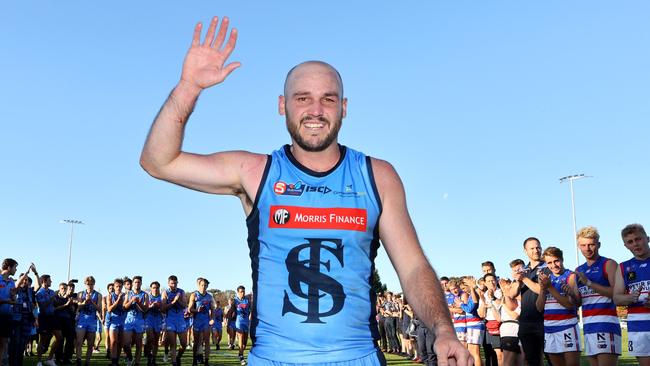
It was the first time his teammates had really seen up close the pain Kirkwood had been experiencing for so long.
His phone ran hot that night with messages of support and Grima asked if he wanted to address the team.
So he did.
“It was nervous and it was awkward, but I felt happy that I didn’t have to hide about it anymore and the potential it may help someone in a similar position at the club,” he says.
That was the first step in starting to turn the corner. He stepped away from captaincy and played out the next few seasons, before the after-effects of a back injury saw him finally pull the curtain on his 223-game league career seven rounds into the 2021 season.
But the healing had well and truly begun.
He was working closely with mental health professionals to develop coping mechanisms.
He started meditating (with varying levels of success). He was learning to express his own feelings and began helping younger blokes around the club deal with their own issues.
He got a name for the condition he was dealing with: severe anxiety.
Then he started talking publicly about his experiences; the dark days but also how he found his way back through, he says, a mixture of letting people in and unconditional honesty.
“I guess it was acknowledging what’s going on,” he says.
“Yeah. I was probably fighting it for a long time, saying to myself, ‘this isn’t happening and I can’t let anyone know what’s going on.”
It also allowed him to be more open with those closest to him, those who stood by him when they didn’t know what was going on, nor how to help.
“The support that I got from mum and dad, my brother and his family and my partner Brooke, I’ll never be able to pay it back for what they did,” he says.
“Brooke said she would go to work in the morning and come home and I’d be in exactly the same spot as when she left nine hours earlier. And I just thought the day had gone real quick. And she felt like she was talking to a zombie sort of thing. Looking back you feel horrible and selfish, but I just didn’t know.
“And then I think about the open and honest conversations we can have now about anything. I guess that’s a blessing in disguise.”
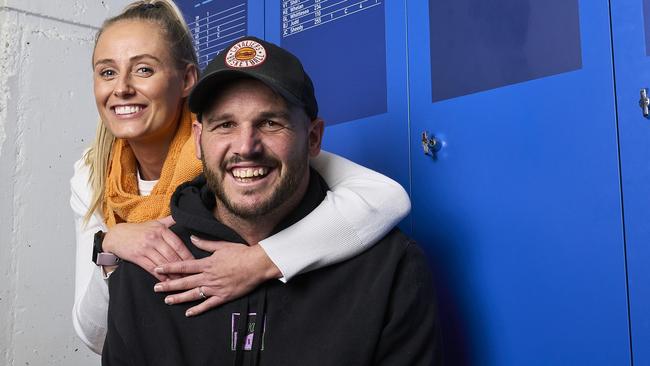
That honesty also helps when he looks in the mirror for a condition he knows he will likely have to deal with every day, for the rest of his life.
“You need to acknowledge when it’s a bad day, which will happen,” he says.
When it does, he turns to what he knows best; getting the body active and trying to switch off the brain. It’s the closest he gets to mindfulness.
He’s still playing footy (for Tanunda in the Barossa Light and Gawler Football Association), but sometimes it’s the most simple things that work the best.
“It’s getting up and going for a walk with the dogs or going for a run or listening to music or something that helps me,” he says.
Today Kirkwood works as a full-time community engagement specialist with the Breakthrough Mental Health Research Foundation. The job is expansive, but a key part is talking to sporting clubs and community groups about mental health, and being a key member of the Mates, Meal and Mental Health team.
His message is multi-layered, but he encourages people to be as open as he has tried to be.
“The best thing that I did was working with it, rather than just pushing it away. People need to be open and have the conversation with the appropriate person or people,” he says. “For me, that was my parents and my partner and being honest with them, rather than sugar coating it. Also seeking out professional help.
“And although it’s hard for them to hear or to have that chat, it was the best thing because we could work together to go for that.
“But I also think finding what works for you. I (researched) that writing in a journal every day is a way to help you handle and work with poor mental health and it definitely works for a lot of people.
“But it didn’t work for me, because it was getting me more anxious. I’d start worrying in the evening knowing I had to write in the journal and then it would get to 9.30pm and I’d be thinking ‘What am I going to write about’, then have a mental blank and that would stress me more that I couldn’t do it.
“Then I’d try meditating, but I’d struggle to stay still for too long.
“So for me I’d need to keep moving, whether that’s going for a run, shooting the basketball or bike ride, I’d look to do whatever brings a release, a bit of joy.
“And yeah, just if there’s something that brings you 10 minutes of release or joy, then do it. It’s not the same for everyone.”
(In 2019, Kirkwood rode his bike, rode his skateboard and ran from Perth to Adelaide to raise funds for Breakthrough).
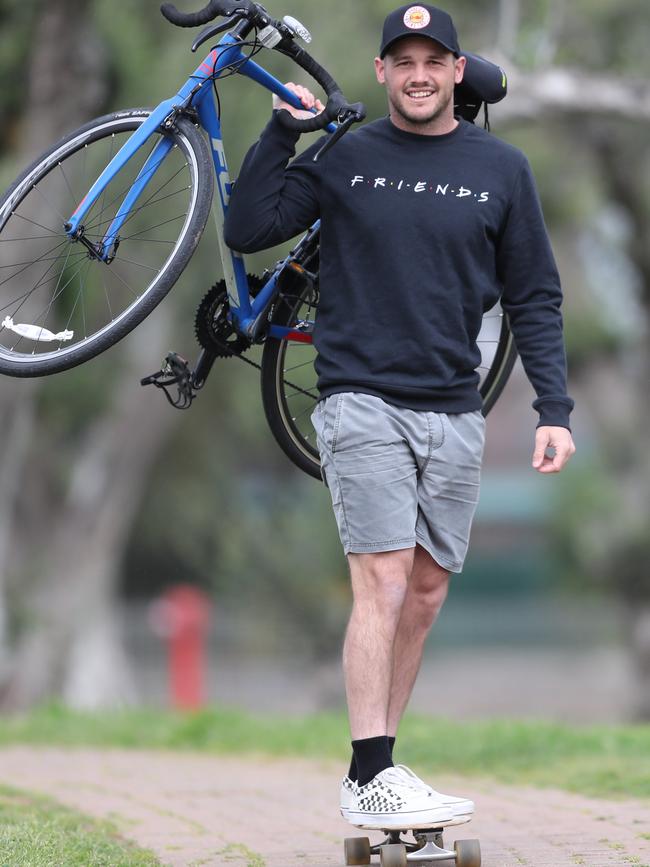
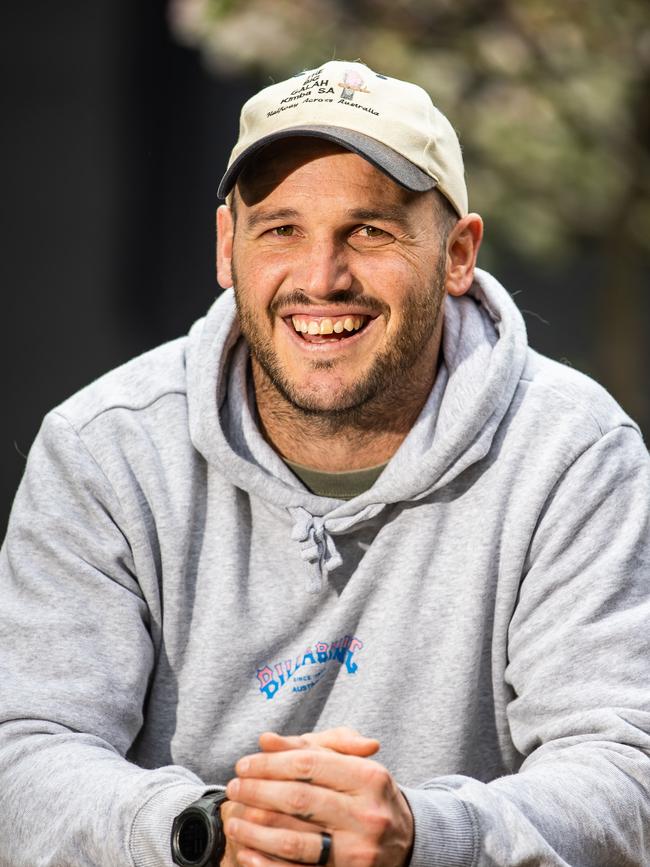
Beyond this, he wants people to see mental health issues as normal. The same as a bad knee or ankle. Something that pretty much everyone, at some point in their life, has to deal with in some capacity.
“In footy you get injured and, depending on how big the injury is, you have to do your six month or six weeks rehab,” he says. “Mental health is no different. It’s the same sort of thing. The more we can normalise it, the better.”
There’s a bit of a break and then another exercise starts, this time outside on a footy oval, with the group split into pairs and separated by the white line. Called “Step to the Line” it aims to encourage groups to open up further; to normalise challenging experiences as a group.
To be fair, these are best experienced, not explained. Here the questions start off slowly and are fairly vanilla at first.
Do you wear glasses? Do you play footy?
Slowly they start to get a little heavier.
Have you cried recently?
Have you felt bullied?
Heavier again.
Do you feel no one really understands you?
Have you felt suicidal?
Men shuffle forward and back in silence.
Conversations ensue without a word being spoken. It ends with an embrace, which lances any tension. There are then handshakes and more than a few laughs.
This is the perfect time for comedian Marc Ryan to take the mic.
Ryan rolls up his sleeve to reveal a tattoo on his left arm. It’s a grim reaper inside a red “no” circle. It means simply: “I’m not dying today.”
He recalls another night he was having a drink at the Flagstaff Hill hotel. He noticed a waiter with a tattoo on her wrist. It said: “Surviving today is just enough.”
“Hey, I get you,” he told her and rolled up his sleeve.
It’s still a daily battle for Ryan. He gets suicidal thoughts. He has days when he doesn’t want to get out of bed. Sometimes, he admits, he still drinks too much.
But through it all, and despite the struggles (or maybe because of them), he’s found a voice and a purpose.
And it’s enough to keep him going.
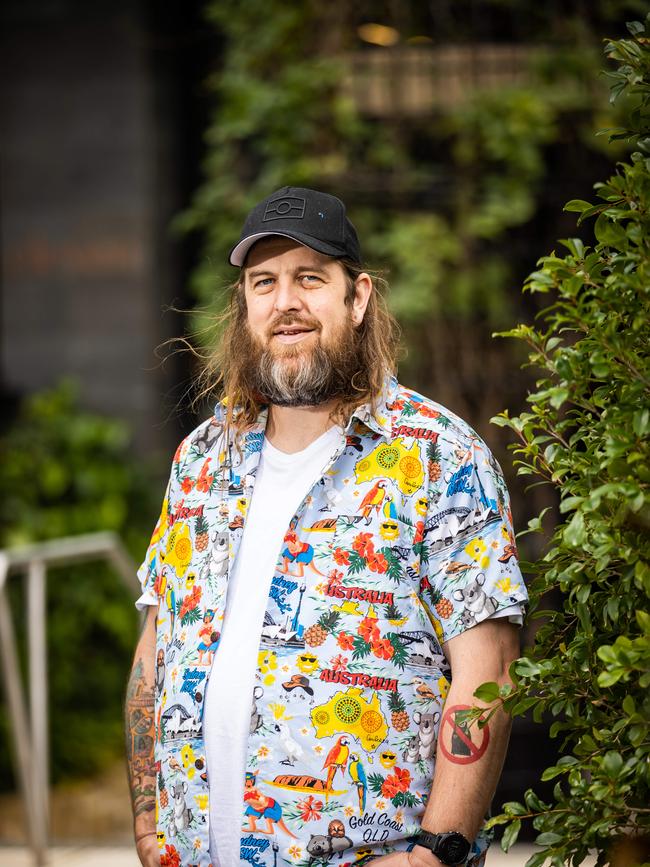
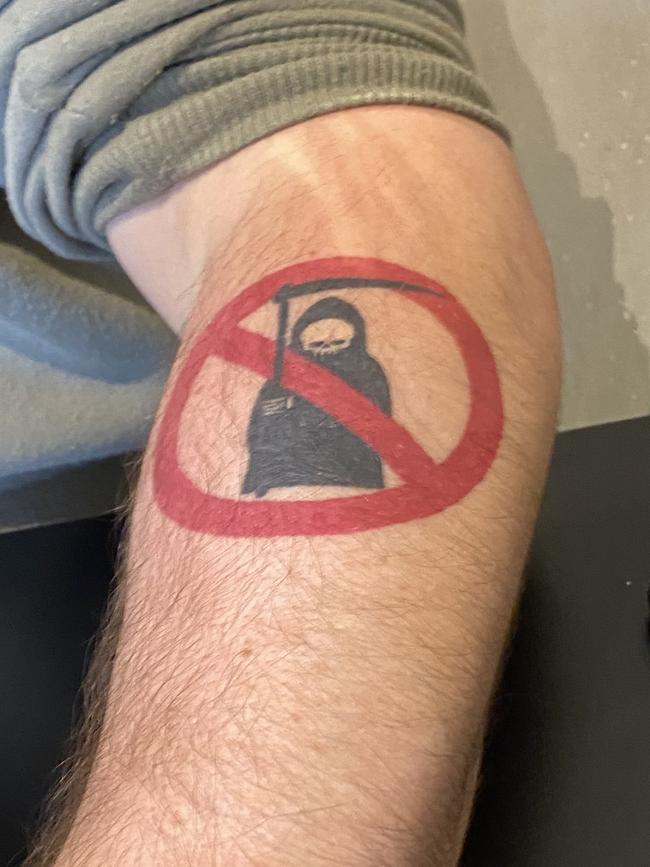
A stand-up comedian known as “The Beautiful Bogan”, he uses comedy to spread his message of suicide prevention and courage but, most of all, hope.
He recalls one night at a pub in Gawler. He was worried about the show once he walked into the venue. Too many people at the pokies. No one really listening.
He had on him a bracelet he had just ordered from the US which made him feel a little better. It said: “Another day with you.”
He did his spot and it went pretty much as expected. “Then the people that organised it came up to me and said, ‘You don’t know what just happened’,” he says.
“I said, ‘What do you mean?’ They said, ‘You have no idea’. Then they tell me a lady popped into the show by accident and heard my story and then stuck around.
“Her plan for that night was that she would come to the pub, spend a lot of money and then she was going to take her own life.
“But she saw the show, she reached out to them and they said, ‘Look we’ll get you into services or whatever you like to help you’.”
He went looking for the woman and found her near the pokies.
“She looked at me, burst into tears and I started crying,” he says.
“And I gave her the bracelet.”
This is by no means an isolated incident.
After another show, a farmer comes up to him in a rage, calling him a “f--king liar”.
“And I say, ‘Whoa, whoa, just tell me what’s going on?’,” he says.
“And this bloke says, ‘I don’t have my mum and dad, I’m a single child. I never married. You said we all have something to live for. I don’t have anything to live for’.
“But I said, ‘Well you’re a farmer right? Which means you’ve got a dog, right? So you’re just going to take off and leave that dog wondering where you are?’ And he said ‘Well, just go and get me a beer’.”
Ryan’s show draws heavily from his own experiences. It is bold, confronting, and often laugh-out-loud funny. He uses it as both a shield and an explainer for a childhood that was anything but.
His long-term diagnosis of PTSD stems from significant trauma; he says he was, among other things, handcuffed to a clothesline by a close family member and tortured as part of a prolonged pattern of abuse. “He used to like sticking pegs on my face and get dogs barking at me,” he says matter-of-factly. “I had coffee with a mate and told him the story. He said, ‘You realise that’s not a normal childhood’. I do now but, at the time, I didn’t know any different.”
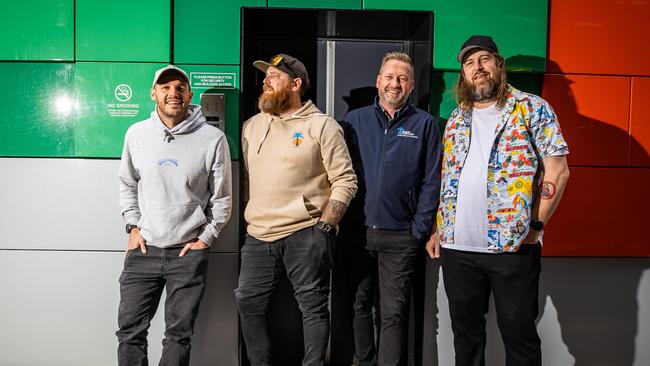
Ryan has a way about him that makes you immediately relaxed in his presence. He’s quick witted and self-effacing. He also has the ability to make people laugh. A lot.
It’s a talent he first really noticed when he was best man for a mate’s wedding. Before long, he had the crowd in tears. When he first started seeing a counsellor, he was asked when was the last time he felt really good in life?
The speech sprang to mind. He decided in that moment he wanted to be a stand-up comedian. The counsellor advised against it, reasoning it was a job that would amplify his vulnerability and suicidal tendencies.
“But I’ve never been great about taking advice from counsellors,” he says.
Within a week he was out looking for an Open Mic night. He’s been doing it ever since and he reckons it saved his life.
He did 30 days straight touring his show “The Beautiful Bogan v The Black Dog”, he’s performed at The Fringe, he’s worked alongside Wil Anderson, Adam Hills, Dave Hughes and good mate Fiona O'Loughlin.
Now he’s committed to Mates, Meal and Mental Health after running into Jeremy Edwards one night in Kimba. “I just thought he looked just like me,” he says.
He’ll travel anywhere he’s needed – mines, footy clubs, regional towns with 10 people, city hotels with more than 100. It doesn’t matter.
He’ll tell his story. He’ll make people laugh, and cry. And he’ll be honest. He can’t “fix” things. But he can talk, and he can listen, and he can make people feel better for half an hour or so. He’ll talk about his childhood, his struggles, but then make fun of his family or his kids, most often himself.
There’s a serious side too. Whenever he walks into a crowded room and sees a group of men, his mind automatically does the maths and subtracts seven blokes out of that group (about the number of men, nationally, who will die from suicide each day. On Wednesday this week, the ABS released the 2021 cause of death data. It showed there here were 3144 deaths (8.6 per day) due to suicide in Aus in 2021 and 2358 (6.5 per day) were males.)
It’s a statistic he’s determined to help reduce and goes on to talk about NBA legend Muggsy Bogues to illustrate the point.
“I’m a massive NBA fan,” he says. “Muggsy Bogues should never have played in the NBA. He was five foot three, the smallest player ever. But he used what he had, he stole the ball and he was able to dribble around people.
“So when I thought about that, I thought what does that mean for me? What do I have?
“I have authenticity. I authentically want to see people live and I authentically want to share my story. And I really do want to tell people that I get it.”
Ryan’s determined to keep going. Sometimes it’s just as simple as putting one foot in front of the other. The key is to never, ever, give up. It’s this message he wants people to take on.
“If someone is ever right on the edge I’d just say go to bed. Do nothing, just go to bed,” he says. “Then in the morning contact the doctor or reach out to someone.
“I get it. You’re dark. When you’re on that cusp, you don’t think anyone can help or cares.
“You really don’t. Right then in that moment, you think no one gives a shit if you’re in this world or not. But they do, they actually really, really do.
“So just go to bed, have a sleep. You don’t even have to sleep well. Just wake up. Just wake up. Then reach out to someone in the morning. The main thing is that you’ve seen the morning”
In terms of his own trauma, he’s now undergoing intensive, invasive fortnightly therapy to rewrite the story of his childhood, where he becomes the adult saving the child from abuse, which seems on the face of it a pretty good metaphor for what he does every time he picks up the mic.
The group hangs around for a while, chatting to the locals. People tell them about the impact the session has had. Many clearly enjoyed it. Some found it challenging. Others are still clearly processing the whole thing.
No one questions its value. The fact they are made to feel safe and coping strategies are shared obviously helps.
The free-flowing conversations also reflect the confidence which has built throughout the evening.
The general consensus is people feel better leaving than entering. A lot.
One person intimates it was the circuit breaker to stop him doing the unthinkable.
As with most nights, John Mannion, Jeremy Edwards, Marc Ryan and Zane Kirkwood are among the last to leave.
Then they’re off to the next footy club, the next business, the next country town, wherever they are needed. Telling their stories, sharing the message that it’s OK to be vulnerable, it’s OK to speak up and you are never, ever alone.
And knowing that if it makes a difference to just one person, it’s all been worth it.
If you or someone you know is in crisis, please contact:
■ Lifeline: 131 114 or lifeline.org.au
■ Suicide Call Back Service: 1300 659 467 or suicidecallbackservice.org.au
■ Beyond Blue: 1300 224 636 beyondblue.org.au/forums
■ MensLine Australia: 1300 789 978 or mensline.org.au




